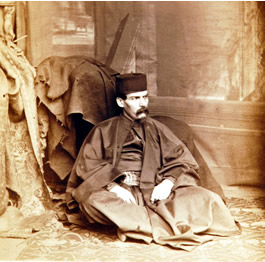Online Exhibition: Famous Victorians
Foreign Travel and Exploration
The Victorian period was a time when there was great pressure to discover new territory and to spread the British Empire and Christianity. Many missionary societies had been started after the 1790's and missionaries like David Livingstone in Africa and James Chalmers in New Guinea were heroes and inspired many others to follow their example. Britain fought military campaigns to gain territory in India and Southern Africa and to influence affairs in the Crimea.
Sir Richard Francis Burton (1821-1890)
Richard Burton was a linguist who translated 30 books including an unexpurgated version of the shocking Karma Sutra. He wrote books about his travels to search for the source of the Nile, discovering Lake Tangyanika. In many ways he is an example of a nastier side to the Victorians, writing racist works attacking Jews and Black people. He wrote on ethnology, studying different types of people in a supposedly dispassionate way, but in fact reducing their characteristics to stereotypes. His writings were very popular.
When he was young he travelled Europe with his parents, shot at stained-glass church windows at the age of 10 and visiting French and Italian brothels and taverns as a teen-ager. He was educated at Oxford University but got expelled for gambling at horse-races.
He joined the army of the East India Company and studied Hindi, Arabic and other languages. Whilst in India he was sent in disguise to write a report on brothels, but when he reported that many of the customers were English soldiers he was sent home in
disgrace. He wrote three books about his experiences in India and one about the Muslim holy cities of Mecca and Harar (in Somalia), which he visited in disguise (Only Musims are supposed to visit these cities and he is thought to be the first Non-Muslim to have done so).
In 1854 he returned to Somalia with John Speke, to search for the source of the Nile, which they discovered on a second expedition during 1857-58, although the two argued and disputed the source. He became famous for this feat when he returned England. He also visited America, where he studied Mormons, Brazil and the Middle East and published a volume of poems. In all his travels of the world he learned 25 languages, 40 including various dialects. When he died his wife burned all his papers and wrote a glowing account of his life saying that he was a good Catholic and missing out all the unpleasant material.

Sir Richard F. Burton. From Portraits of Men of Eminence vol 3 p73